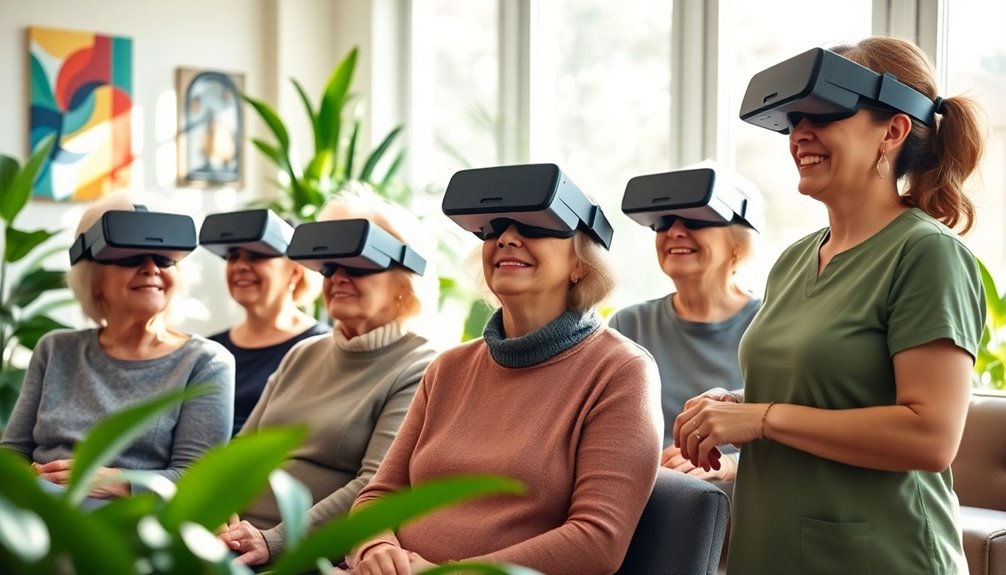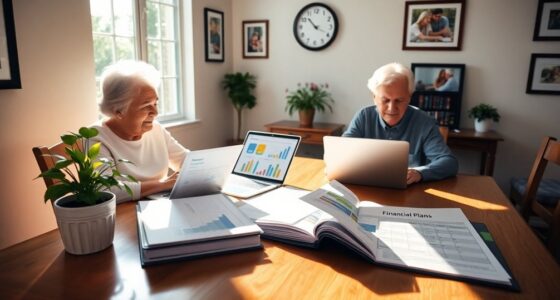Elderly care is evolving with technology, making life easier for seniors. Digital health tools enhance care coordination and patient engagement. Wearable devices provide real-time health tracking, while smart medication management apps guarantee adherence. Remote patient monitoring enables continuous health oversight, reducing hospital visits. AI and predictive analytics forecast health issues before they arise, keeping you proactive. Smart home technologies boost safety and independence. Discover the latest innovations that can transform elderly care experiences for better outcomes.
Key Takeaways
- Digital health technologies provide real-time health tracking and improve chronic disease management, enhancing elderly care quality.
- Remote patient monitoring with wearable devices significantly reduces hospital readmissions and supports independent living.
- Telemedicine facilitates easy access to healthcare, reduces travel risks, and lowers overall healthcare costs for seniors.
- Smart medication management solutions ensure timely medication adherence and enhance communication between patients and healthcare providers.
- Emergency response systems offer real-time alerts for unusual activities, enhancing safety and peace of mind for families.
The Role of Digital Health in Geriatric Care
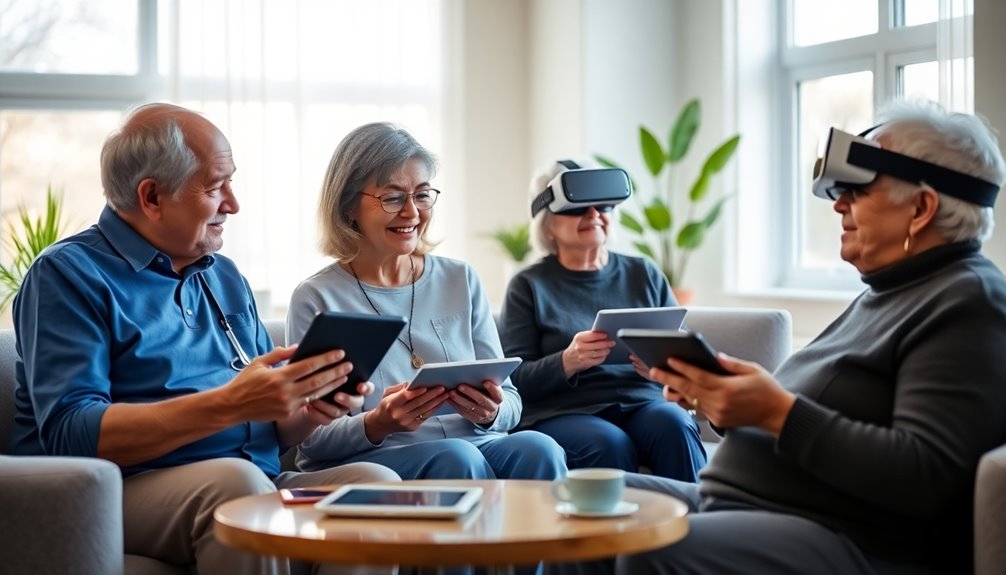
As digital health technologies become more integrated into our daily lives, they play an essential role in enhancing geriatric care.
You'll find that remote patient monitoring using wearable devices allows for real-time health tracking, which is vital for managing chronic conditions. These tools enable you to keep an eye on health metrics, alerting caregivers to potential issues swiftly.
With AI algorithms and predictive analytics, patterns in your health data can be identified, leading to improved chronic disease management and reduced hospital readmission risks.
Furthermore, digital health solutions support medication adherence by sending reminders, ensuring you stay on track with your prescriptions. Additionally, understanding filial responsibility laws can guide families in planning for the financial aspects of elderly care, ensuring that necessary support is provided.
Enhancing Patient Engagement Through Technology
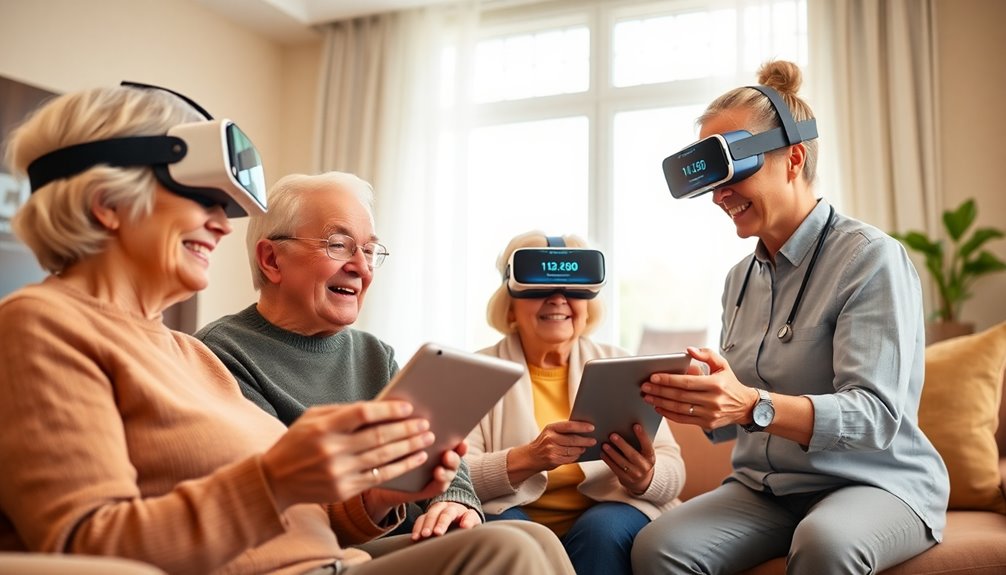
In today's healthcare landscape, technology can greatly boost your engagement in managing your health.
With digital health tools like patient portals and mobile apps, you can easily communicate with your providers and stay on top of your treatment plans.
Empowering yourself through these resources not only enhances your involvement but also leads to better health outcomes. Additionally, understanding digital literacy for kids can help you foster a more informed environment at home, making it easier to discuss health-related topics with younger family members.
Digital Health Tools
Digital health tools are revolutionizing how elderly patients engage with their healthcare. By utilizing these technologies, you can experience:
- Patient Portals: Access your medical records and communicate easily with healthcare providers.
- Mobile Health Apps: Get reminders for medications and appointments, boosting medication adherence.
- Integrated Care Platforms: Enjoy coordinated communication among different providers, guaranteeing holistic care.
- User-Friendly Access: Easily find health information that fosters independence and supports proactive management of your health.
With over 61% of adults aged 65+ owning smartphones, embracing these digital health tools empowers you to take charge of your wellness. This approach aligns with the concept of transforming spaces that enhance the quality of life for seniors.
They enhance your engagement and guarantee that you stay informed and compliant with your treatment plans, leading to better health outcomes.
Empowering Patient Communication
When you feel empowered to communicate with your healthcare providers, it can greatly enhance your engagement in the decision-making process. Digital platforms like patient portals and health apps are designed to support elderly patients in managing their health information. This empowerment leads to better health outcomes and satisfaction. Additionally, establishing clear communication channels is essential to navigating emotional volatility in healthcare situations, as dreaming during REM sleep has been shown to play a role in emotional processing. Understanding the importance of advance care planning can also help patients and families make informed decisions about their care.
| Tool | Benefits |
|---|---|
| Patient Portals | Easy access to medical records and messaging |
| Health Apps | Medication reminders and appointment alerts |
| Care Management | Coordinated communication among providers |
| Integrated Platforms | Holistic care for elderly patients |
Using these tools, you can actively participate in your care management, ensuring coordinated care that improves your overall well-being. When you stay informed, you take control of your health journey.
Remote Patient Monitoring for Continuous Care

Remote patient monitoring (RPM) transforms how you manage your health by enabling real-time tracking of essential signs.
With wearable devices, you can easily keep tabs on chronic conditions and guarantee timely care when needed.
This innovative approach not only enhances your health management but also supports better communication with your healthcare providers.
Real-Time Health Tracking
As healthcare continues to evolve, real-time health tracking through remote patient monitoring (RPM) offers an innovative solution for managing the health of elderly individuals.
This technology empowers you to take charge of your health while ensuring continuous monitoring.
Here are four key benefits of RPM:
- Timely Alerts: Wearable devices track essential signs and alert caregivers to abnormalities.
- Reduced Readmissions: Studies show RPM can reduce hospital readmissions by up to 40%.
- Proactive Health Management: Health monitoring apps remind you about medications and appointments.
- Enhanced Independence: You can maintain your independence while being closely monitored for early interventions.
With real-time health tracking, you can foster a proactive approach to health management, improving your overall quality of life.
Wearable Device Integration
Wearable device integration is revolutionizing elderly care by enabling continuous monitoring and proactive health management.
With wearable technology like smartwatches and fitness trackers, you can track crucial signs such as heart rate and blood pressure in real-time. This health monitoring helps detect issues early, reducing hospital readmissions by up to 40%.
Many devices come equipped with fall detection, alerting caregivers instantly if an incident occurs, which enhances your safety while aging in place.
By connecting these wearables with mobile health apps, you can manage personalized care plans and receive medication reminders.
Continuous health data can be shared with healthcare providers, improving care coordination and effectively managing chronic diseases like diabetes and hypertension, ensuring you stay healthy and independent.
Chronic Condition Management
Effective management of chronic conditions is essential for maintaining health and independence as you age.
Here's how remote patient monitoring can help:
- Wearable devices track crucial signs and health metrics in real-time.
- Health monitoring apps remind you about medication adherence and provide tailored resources.
- Timely interventions from caregivers can prevent complications by detecting abnormalities early.
- Reduced hospital readmissions by up to 40% improve outcomes for elderly patients.
Incorporating regular screenings for early detection of potential health issues can further enhance the effectiveness of remote patient monitoring.
Innovative Health Monitoring Apps for Seniors
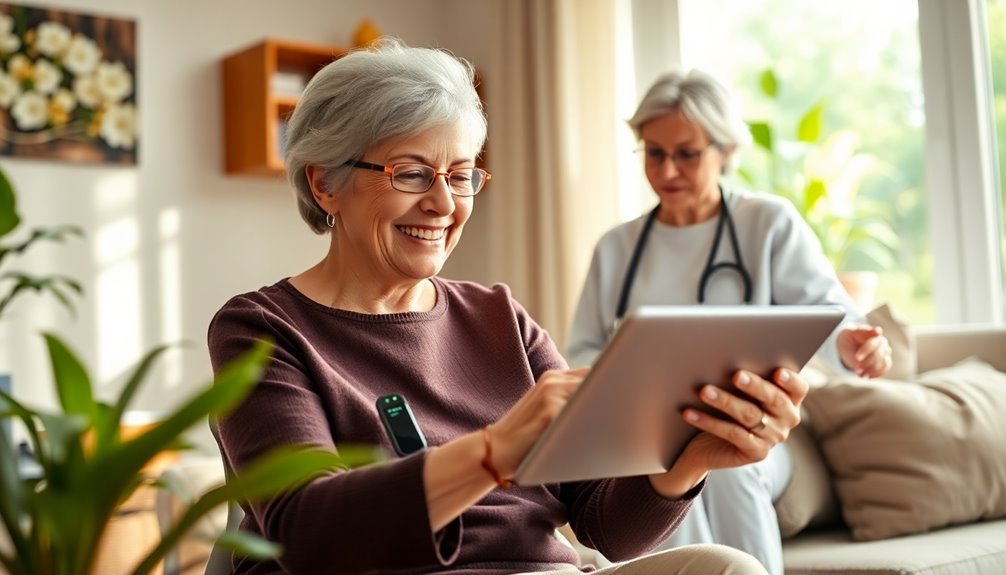
With technology rapidly evolving, innovative health monitoring apps have emerged as essential tools for seniors to manage their health effectively.
These apps, like Glucose Buddy and CardioVisual, allow you to track crucial signs and receive medication reminders, enhancing disease management. They feature user-friendly interfaces, making them accessible even if you're not tech-savvy, which encourages consistent engagement with your health.
By incorporating health metrics tracking, you can monitor your progress and improve medication adherence. Many apps also include wellness components for mental health, offering mindfulness and stress reduction techniques. Furthermore, these tools can be particularly beneficial for seniors experiencing chronic feelings of emptiness, as they provide a sense of purpose and connection to their health management.
Additionally, these apps promote better communication between seniors and healthcare providers by sharing health data, leading to improved health outcomes and coordination of care.
Smart Medication Management Solutions

As you navigate the complexities of managing medications, smart medication management solutions can greatly simplify the process. Here are four key benefits:
- Timely Reminders: Apps like Medisafe guarantee you follow medication schedules with alerts.
- Streamlined Dispensing: Devices like PillPack provide pre-sorted dosages, minimizing missed doses. This is similar to how Golden Dachshunds combine traits to create a unique experience for their owners. Additionally, medication adherence can significantly improve health outcomes and reduce hospital visits.
- Enhanced Communication: Digital tools promote real-time updates between you and healthcare providers, improving medication adherence.
- Continuous Tracking: Smart glucose monitors enable tracking of blood sugar levels, sharing data with your healthcare team for better diabetes management.
With the integration of electronic health records, these solutions enhance care coordination, assuring that all healthcare providers have access to your up-to-date medication information. Additionally, ensuring you understand the importance of routine health checks can further support effective health management.
Embracing these innovations can lead to safer, more effective management of your health.
Telemedicine and Virtual Care in Elderly Health
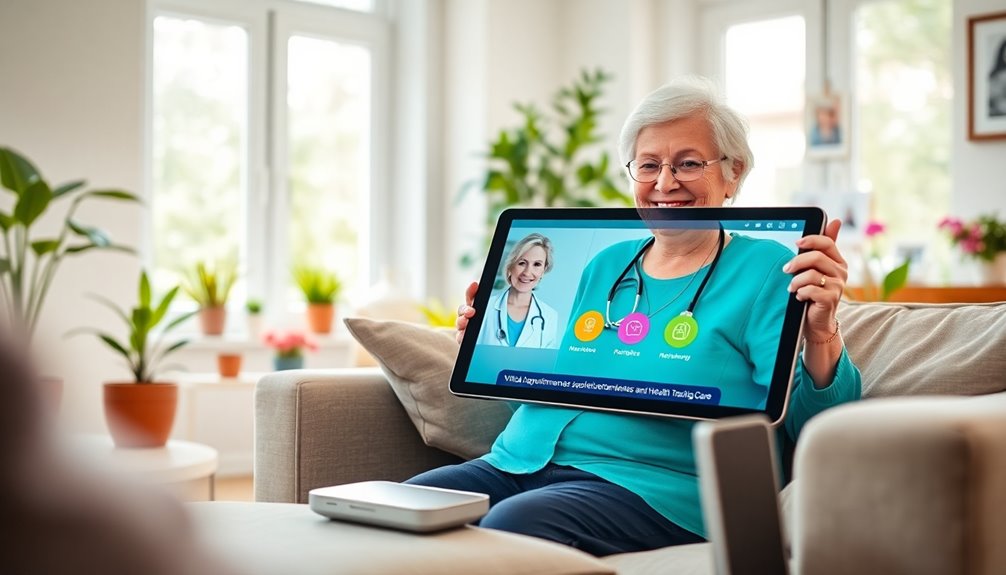
Telemedicine makes it easier for you to consult healthcare providers from home, eliminating the hassles of travel.
With enhanced access to specialists, you can get expert advice without the wait.
Plus, these virtual care solutions can save you money while ensuring you receive the care you need.
Remote Consultations Convenience
- Reduced Travel: No need to commute, minimizing exposure to health risks.
- Comprehensive Care: Manage mental health, prescriptions, and urgent needs through virtual care.
- Cost-Effective: Potential to lower healthcare costs by up to 30% with fewer hospital visits.
- Enhanced Engagement: Easily communicate with healthcare providers from home, boosting adherence to treatment.
Additionally, telemedicine can help monitor signs of illness more efficiently, ensuring timely interventions for various health issues.
Enhanced Access to Specialists
Remote consultations not only simplify access to primary care but also open doors to specialized medical services for elderly patients.
With telemedicine, you can connect with specialists without the hassle of travel or long waits in crowded clinics. This makes healthcare more accessible, especially for those in remote areas.
Virtual care platforms enable timely consultations, allowing for continuous management of chronic conditions and enhancing the quality of care. By providing access to specialists you mightn't find locally, these services improve health outcomes appreciably.
Furthermore, features like secure messaging empower seniors to stay engaged in their healthcare, ensuring they receive the necessary support and guidance.
Embracing these innovations is key to promoting better health and well-being for elderly individuals.
Cost-Effective Healthcare Solutions
As healthcare costs continue to rise, finding cost-effective solutions for elderly care becomes essential.
Here are four key benefits of telemedicine and virtual care:
- Reduced Costs: Telemedicine can cut healthcare expenses by up to 30% by minimizing in-person visits.
- Timely Access: Virtual care enables seniors to connect with healthcare providers quickly, facilitating early interventions.
- Remote Monitoring: Advanced monitoring systems allow caregivers to track chronic conditions like diabetes, improving overall health.
- Mental Health Support: Telehealth services address mental health, vital for the 20% of older adults facing such issues.
Wearable Devices for Real-Time Health Tracking

Wearable devices are transforming elderly care by providing real-time health tracking that empowers both seniors and their caregivers. These devices continuously monitor essential signs like heart rate, blood pressure, and glucose levels, guaranteeing you have the data you need at your fingertips.
| Feature | Benefit |
|---|---|
| Fall Detection | Alerts caregivers immediately after a fall |
| Medication Reminders | Guarantees timely adherence to treatments |
| User-Friendly Interface | Makes technology accessible for seniors |
Integrated Care Coordination Platforms

Integrated care coordination platforms are revolutionizing the way elderly care is managed, ensuring that communication flows seamlessly between healthcare providers, caregivers, and patients.
Here's how they're making a difference:
- Enhanced Collaboration: Electronic health records streamline data sharing among providers.
- Personalized Care: Patient engagement solutions create tailored management pathways for elderly individuals, promoting emotional expression to help them cope with various life changes. This can be particularly important when navigating Louisiana alimony laws during a divorce.
- Proactive Health Management: Tools like patient portals empower seniors to oversee their health.
- Holistic Approach: Integrated platforms address the complexities of geriatric care.
- These platforms can also assist in navigating legal processes like divorce, which may be especially beneficial for elderly individuals facing such challenges.
AI and Predictive Analytics in Geriatric Healthcare

While traditional methods of elderly care often rely on reactive approaches, the rise of AI and predictive analytics is transforming how healthcare providers anticipate and respond to the needs of seniors.
By analyzing historical patient data, these technologies can forecast chronic conditions and assess hospital readmission risks, enabling proactive healthcare interventions.
Continuous monitoring of health data through wearables provides predictive insights that alert caregivers to notable changes before emergencies arise.
AI-driven models have shown the potential to reduce hospital readmission rates by up to 40%, enhancing diagnostic accuracy in managing chronic conditions like diabetes and hypertension.
Ultimately, integrating AI in geriatric care greatly improves health outcomes, ensuring seniors receive personalized and timely care tailored to their unique needs.
Smart Home Technologies for Enhanced Safety and Independence
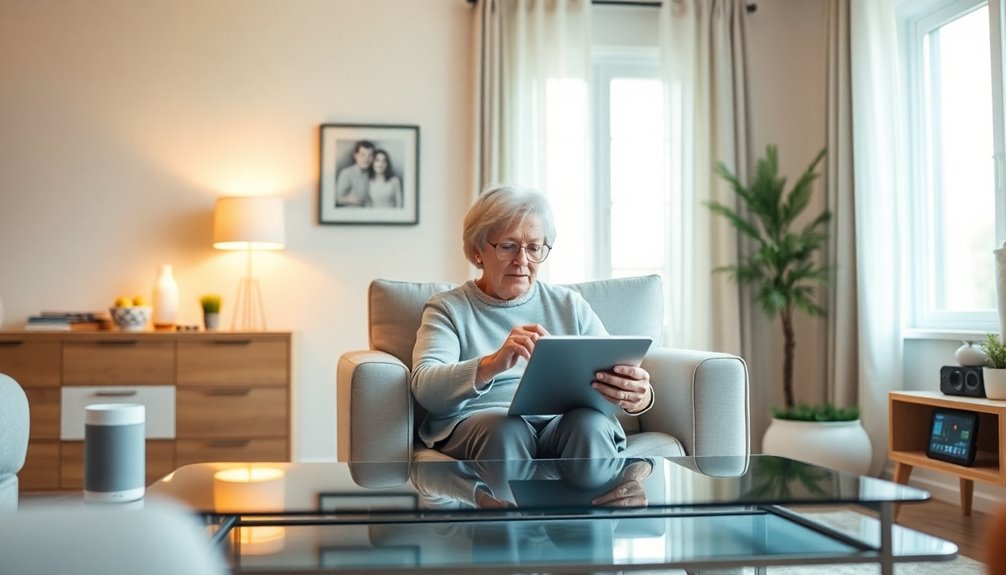
As technology advances, smart home solutions are revolutionizing elderly care by enhancing safety and promoting independence. Here are some key features:
- Voice-activated assistants help with daily tasks, fostering greater independence.
- Automated medication reminders guarantee timely adherence to treatments, improving medication management.
- Emergency response systems provide real-time monitoring and alerts for unusual activity or emergencies.
- Falls detection and monitoring devices can instantly notify caregivers and family members for prompt assistance.
These smart home systems incorporate security features like smart cameras, enhancing safety within your living space. Additionally, integrating these technologies can significantly enhance quality of life for elderly individuals, making their home environment more comfortable and supportive.
Frequently Asked Questions
What Is the Holistic Approach to Senior Care?
The holistic approach to senior care focuses on treating the whole person rather than just their physical symptoms.
You'll consider mental, emotional, and social well-being, ensuring a richer quality of life. By creating personalized care plans that reflect individual preferences and needs, you help seniors thrive.
Incorporating technology for continuous monitoring and encouraging social engagement are key strategies.
Collaboration among healthcare providers, caregivers, and families enhances support for elderly individuals in this extensive approach.
What Is the Trend in the Elderly Care Market?
You'll notice that the elderly care market is rapidly evolving, with a strong focus on digital health technologies. More seniors are using smartphones and social media for better health engagement.
Telehealth services are becoming essential, allowing remote consultations with healthcare providers. Additionally, wearable devices and smart home technologies are enhancing safety and independence.
AI and predictive analytics are also transforming care, enabling early detection of health issues and personalized care plans for better outcomes.
How Can We Improve Care for Older Adults?
How can you enhance care for older adults? Start by embracing technology!
Integrating digital health tools like mobile apps and telehealth can streamline communication and improve health outcomes.
Utilize wearable devices for real-time monitoring, ensuring timely interventions.
Smart home technologies can foster independence while keeping seniors safe.
Ultimately, consider AI analytics to predict health risks early.
What Technology Helps Seniors Age in Place?
Technology plays a crucial role in helping you age in place. Wearable devices like heart rate monitors and fall detection sensors keep track of your health in real-time.
Smart home technology, including voice-activated lights and automated medication reminders, simplifies daily tasks.
Telehealth services let you consult with healthcare professionals from home, while remote patient monitoring systems alert caregivers to any health changes.
AI-powered solutions guarantee you stick to your medication schedule and receive timely help.
Conclusion
Incorporating these cutting-edge approaches into elderly care can truly transform the lives of seniors and their families. With technology enhancing everything from health monitoring to medication management, isn't it time we embraced these innovations to guarantee our loved ones stay safe and engaged? By leveraging digital health solutions and smart devices, we can create a more supportive environment that promotes independence and well-being. The future of elderly care is bright—let's make the most of it!
